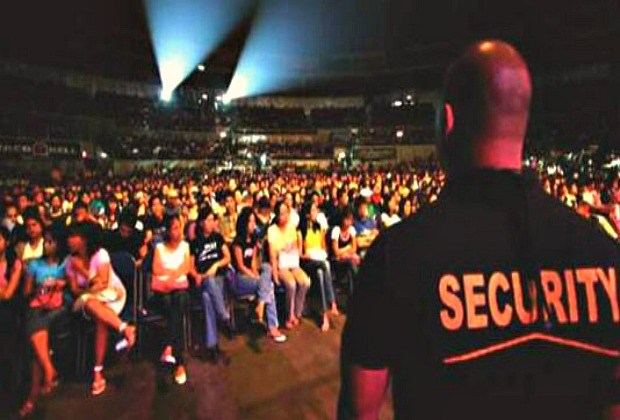
If you are hosting an event, it is your responsibility to ensure the safety of all those in attendance.
Arranging a risk assessment to identify any potential threats that may compromise this and putting measures in place to mitigate this risk is essential, but all too often security is arranged at the last moment and with an inadequate budget.
As unfortunate as it is, the reality is that every time a large group of people gather in a single location, there is a significant security threat that needs to be managed.
Given the devastating consequences of failing to take security seriously, it is recommended that a professional security firm, with experience handling events on a regular basis, is used to help ensure a smooth and incident free event.
Some of the event types which will usually require a professional security team include:
- Festivals
- Concerts
- Sports matches
- Corporate conferences
- Political conferences
- Fundraisers
- Weddings
- Private concerts
These are some of the most common events we handle here at Prime Secure, but the fact is that any event, no matter how many big, will require security of some kind if there is a genuine threat to the safety of any attendees.
Tips for hosting a private event
If you are in charge of arranging a private event of any kind, here are some of the most important things to remember when arranging security.
1. Conduct a threat analysis
Before you can decide which security measures need to be put in place for your event, it is vital to identify the potential threats to safety.
Take note of exactly who is hosting and attending your event, any controversy that the vent may bring, the layout of the venue, and anything else you think may be relevant to your security.
When conducting a risk assessment of an event, some of the most important questions to ask include:
- How many people will be in attendance?
- Are there likely to be protests from any specific groups or individuals? – Most relevant for political and corporate gatherings.
- How many people can safely attend?
- Are there appropriate emergency escape routes?
- What established security does the venue itself have in place? – In-house security staff, alarms, CCTV, etc.
If you have any doubts over what to look for when conducting a security assessment or would rather let a professional use their trained eye and experience to conduct it themselves, contact a company like Prime Secure Event security that provides event security on a regular basis.
2. Keep security visible
It can be tempting to try and keep your security low-key and discreet, by asking security staff to dress in plain clothes for example, in an attempt to keep attendees at ease, but this might actually have the opposite effect.
A visible security presence can be reassuring to event guests, giving them peace of mind that they are safe and protected whilst attending.
The main goal of security should never be to deal with incidents as they happen, but rather to prevent them from happening all together.
This is another reason that security should always be visible as potential troublemakers are far less likely to cause problems if they see a uniformed security officer, CCTV cameras, or similar.
3. Create Checkpoints
By placing several security checkpoints at regular intervals away from the gathering is a great way to stop unauthorised individuals from being able to gain access.
Any agitators will have to confront security guards well away from the event itself where they pose no threat to proceedings.
The staff positioned on these checkpoints will usually be tasked with checking tickets, verifying identities, and conducting searches if needed.
4. Keep it private
If your event is not open to the public, it might best not to advertise its existence to a wider audience through social media this will only increase the risk of disruption.
It is all too common for corporate events to be announced publicly, but if you believe that there is a realistic threat that your event may be targeted, consider leaving press releases, newsletters, and social media posts until after it has already taken place.
5. Don’t forget cyber-security
Like everything in the modern world, major events are increasingly reliant on technology with digital systems used to manage guest identification and to control the security systems responsible for controlling access.
As a result of this, there has been a significant rise in cyber-attacks in recent years targeting the payment information and identification details of guests and it is crucial that you take your cyber security just as seriously as your physical security.